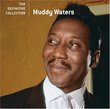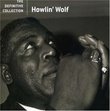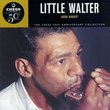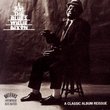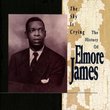| All Artists: Willie Dixon Title: Poet of the Blues Members Wishing: 1 Total Copies: 0 Label: Sbme Special Mkts. Release Date: 3/1/2008 Genres: Blues, Pop, R&B Styles: Chicago Blues, Traditional Blues, Electric Blues, Acoustic Blues, Soul Number of Discs: 1 SwapaCD Credits: 1 UPC: 886972497129 |
Search - Willie Dixon :: Poet of the Blues
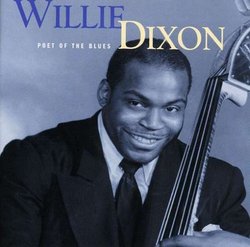 | Willie Dixon Poet of the Blues Genres: Blues, Pop, R&B
One of blues music's greatest composers, Willie Dixon was also a strong performer. This Columbia Legacy reissue is a profile of the artist in his post-Chess Records years and is chock full of classics, many of which have b... more » |
Larger Image |
CD DetailsSynopsis
Amazon.com One of blues music's greatest composers, Willie Dixon was also a strong performer. This Columbia Legacy reissue is a profile of the artist in his post-Chess Records years and is chock full of classics, many of which have been covered by rock bands as well as blues musicians: "Back Door Man," "I Can't Quit You Baby," "Spoonful," "I Ain't Superstitious," "I'm Your Hoochie Coochie Man" ... the list goes on. For all of his achievements as a composer and performer, relatively little of Dixon's recorded work is available, particularly from his later years. Poet of the Blues is an excellent introduction as well as a chance to hear many of these classic songs in their original incarnations. --Genevieve Williams Similar CDs
|
CD ReviewsWords and Music. George H. Soule | Edwardsville, Illinois United States | 11/18/2004 (5 out of 5 stars) "This CD is a compilation of Willie Dixon songs. It is not coherent, but it has a certain comprehensiveness. Containing seven of the nine songs originally issued as "I Am the Blues" in 1970 it more than representative of what Willie Dixon is about. The 1970 recording featured an all-star band of Chicago bluesmen-Shaky Jake on harmonica, Sunnyland Slim on piano, Johhny Shines playing guitar and Clifton James on drums. Dixon played base, of course, on a recording designed to showcase him playing and singing his songs. The first seven songs on this CD not only represent the best of what we call Chicago blues-they are also songs that define the genre in modern times. These are among the songs that Muddy Waters, Howling Wolf, Little Walter, Bo Diddley, Otis Rush, and (dare I say) Mick Jagger and a bunch of Brits made famous. The songs that in turn made those performers famous. Here Dixon plays with his peers to define his own songs. The balance of the CD (and it is a sort of Frankenstein monster collage) comprises tracks by the Big Three Trio. These were recorded between 1947 and 1951, and they are evidence of Dixon's lyrical ability. (Hence, the title "Poet of the Blues") These trio tracks are clearly jazz-Dixon on string base with Leonard Caston on piano, Ollie Crawford on guitar, and Hillard Brown playing drums. The nine tracks on this compilation are among the 21 tracks on Columbia Blues/Roots CD called "Willie Dixon: The Big Three." Regardless of the packaging, this is a fine recording. The 1970 renditions prove Dixon's inventiveness and genius in the context of the people that really matter. Buy this collection. Or find the two CDs that are its source. If you really love Willie Dixon, look for the Chess collections, too." The man who planted the roots perryink2 | castle rock | 09/02/2003 (4 out of 5 stars) "Often imitated and never duplicated, Willie Dixon's influence on the blues and rock and roll defies the imagination. Long before he died in 1992, his lyrics became the well-worn phrases of the genre and his songs the standards of both bluesmen and white boy rockers who weren't even born when Dixon first started his recording career in the early `40s. From the Allman Brothers, Led Zeppelin (who Dixon had to sue to get compensation for their shameless and uncredited pillaging of his catalogue) and Eric Clapton to Steppenwolf, The Doors and Motorhead, his name appears on more song credits than any Chicago bluesman before or after. But no one has been able to better Dixon's originals. The dark-humoured poetry of his lyrics, the strolling rhythms highlighted with boozy piano licks, his unbeatably muscular bass and the aural finesse of his gargantuan vocals are lightning in a bottle. This 16 track collection is a treasure chest, one of the more expansive of its kind, with songs from across the Dixon universe: early material from the Chess vaults (Big 3 Stomp, Signifying Monkey) right through rousing sessions from his career revival in 1970 (Little Red Rooster, Back Door Man, I Can't Quit You Baby, Spoonful).Poet Of the Blues is the story of the man who helped plant the roots." Wrote songs for others, sings them well himself Steven A. Peterson | Hershey, PA (Born in Kewanee, IL) | 04/13/2007 (5 out of 5 stars) "Willie Dixon wrote some classic blues songs that were sung by others, such as Howlin' Wolf, Muddy Waters, and through covers, the Rolling Stones and others. This album makes it clear that Dixon was not just a writer, but a very accomplished singer himself.
Some examples from the CD. "Im a Back Door Man" was sung well by Howlin' Wolf. A much different version was recorded by the Doors. Dixon makes it his own in this cut, with a very different approach. The backing group, by the way, is terrific on this CD. This is a well sung and rollicking version. His voice swirls around the music, with a nice blues sensibility. Shaky Jake's harmonica is noteworthy. Muddy Waters made "I'm Your Hoochie Coochie Man" his. But it was written by Willie Dixon. Here, Dixon makes this song his as well, with some fine blues singing. Howlin' Wolf and The Rolling Stones both sang "Little Red Rooster." Sunnyland Slim's piano playing starts Dixon's version off very smartly. Dixon's fine blues voice does justice to his own work. He takes the song at a slow pace and it works well. Finally, "It's All over Now." The piano work, again, stands out. He begins with a couple poignant lines: "Well it's all over I knew this would end." A good blues song, well sung by Willie Dixon. This represents a good introduction to a portion of Dixon's work. It is, of course, not comprehensive. However, for a "quick and dirty" introduction to some of his best works, this suffices. " |

 Track Listings (16) - Disc #1
Track Listings (16) - Disc #1